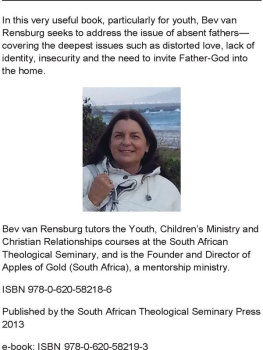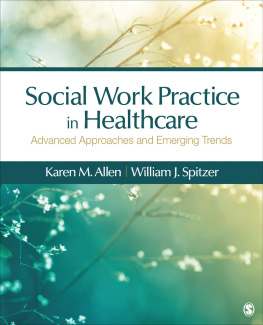SERIES EDITORS INTRODUCTION
Fathers can be a shadowy presence in day-to-day social work practice. Work with children and families can often, by default, become work primarily with children and mothers. Moreover, in recent years, the move to fully acknowledge and credit the contribution of women to society as a whole has tended to favour a spotlight on mothers. This volume provides an important redress, arguing that health and social policy in general and social work in particular need to become much more sensitive to the critical role of the father. This should recognise that a father can be a resource, a risk or, indeed, both a resource and a risk. Through carefully presented vignettes Gary Clapton illustrates the opportunities to work more positively with fathers and to ensure that child and family policies do not, by default, become inappropriately skewed.
An introductory chapter captures some of the changing demographic and image of fatherhood over recent years and highlights the wide range of categories and involvement embraced by the term. , emphasising again, however, the importance of an approach based on positive practice.
Having presented an evidence-based argument for the approach, the final chapters explore how the model of positive practice with fathers can be embedded at team and agency level. The author has an obvious passion for his subject; however, the achievement of this volume is that it presents a reasoned argument not a polemic. Therefore its strength is all the greater.
| Dr Joyce Cavaye | Professor Alison Petch |
| Faculty of Health and Social Care, The Open University in Scotland, Edinburgh | The Institute for Research and Innovation in Social Services (IRISS), Glasgow |
INTRODUCTION
Parenting is important to men, and fathers are important to their children and families. The underpinning belief of this book is one that understands the benefits of father-inclusive practice and one of optimism about social work with the vast majority of fathers and their children and families. It is also realistic and practical about those fathers whose behaviour makes it hard to be positive.
While not intending to favour or prioritise one way of being a father or doing fathering among the possibilities that exist, the positive practice in this book concerns the men who accept or are ascribed parental responsibility for a child, or would do so if given the opportunity.
The book is about reaching out to, engaging and then working with fathers. It is strengths-based rather than deficit-driven. It also addresses agency practices, trainers and educators. Fathers workers and support groups are included because of the growing resources that they provide. Firstly, however, the beginning two chapters outline some crucial contexts. These are the striking changes that have taken place in fathers behaviour, the intersection of fatherhood and masculinity and what we know about the contribution positive fathering can make in the lives of children, women and families. This foreground concludes with the way that fathers have been overlooked by professionals and policymakers and the negative manner in which they are depicted.
Changing fathers
Fathers now play a more active role in childcare and domestic life in general. While fathers still do less of the parenting than mothers, their involvement has grown and continues to grow. Fathers involvement in childcare has increased from less than fifteen minutes a day in the mid-1970s to three hours a day during the week by the late 1990s, with more at the weekend. Fathers now do a third of parental childcare, which is an eightfold increase in a generation for fathers of preschool children (OBrien, 2005).
Overall, there have been major shifts in the manner in which fatherhood is thought of and a growing emphasis on what might be described as the new father who actively participates in the care of his child, values girls as of equal worth to boys and engages with the child as an infant rather than remaining on the sidelines until the child is older (Haywood and Mac an Ghail, 2003).
In the twenty-first century, fathers come in all shapes, sizes and colours. While some biological fathers do not do fathering, other non-biological fathers can and do: for example, grandfathers/uncles, foster fathers, adoptive fathers and stepfathers (the last in increasing numbers Sullivan and Dex, 2009). Todays father is no longer always the traditional (perhaps stereotyped) married breadwinner and disciplinarian in the family. He can be single or married; externally employed or a stay-at home father; gay or straight; an adoptive or step-parent; and a more than capable caregiver to children as they face the various challenges that come with growing up.
Changing expectations
Changes in the law (in 2003) have given parental responsibility to fathers named on their childrens birth certificates, whether or not they are married to the mothers. This reflects an emerging emphasis on the preservation of childrens relationships with biological and social fathers (Trinder and Lamb, 2005). The extension of paternal leave is also an indicator of growing acknowledgement and expectation at governmental level of the importance of fathers in the lives of their children. The issue of fathers has risen on the agenda of politicians and policymakers in recent years. In 1998 the then UK governments Supporting Families initiative made it clear that: fathers have a crucial role to play in their childrens upbringing. This momentum has continued with leading government ministers emphasising the importance of fathers:
I want to see a revolution in how teachers, midwives, doctors, early years and all childrens services staff routinely talk to and provide opportunities for the involvement, not only of mothers but also fathers, from pregnancy and right through childhood and adolescence (Hughes, 2008).









